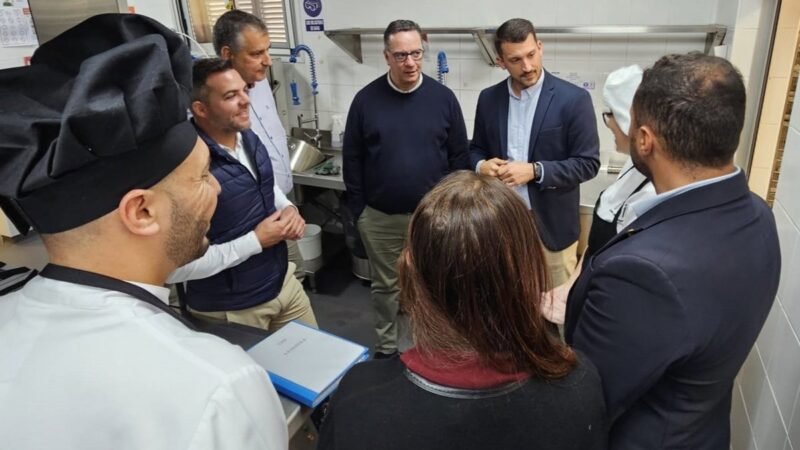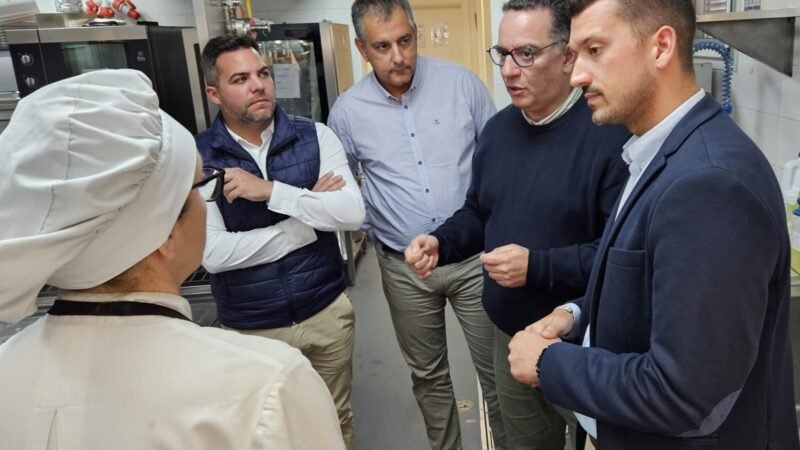Acuerdo Marco de obras para el agua en Lanzarote

Betancort: «The declaration of the water emergency is the legal umbrella that allows us to sign this Framework Agreement, a fundamental tool to streamline the administrative procedures of works that are vital to minimize water cuts and breakdowns in the comprehensive water cycle.»
An investment of 5 million euros will be made, of which 2 million will be executed during the current year 2025 and the remaining 3 million in the year 2026.
The President of the Cabildo de Lanzarote, Oswaldo Betancort, and the representatives of the contracting companies signed the Framework Agreement for the renovation, expansion, and improvement of the supply, sanitation, and reclaimed water networks in Lanzarote and La Graciosa on Monday.
The Framework Agreement involves an investment of 5 million euros from the own funds of the Lanzarote Water Consortium, of which 2 million will be executed during the current year 2025 and the remaining 3 million in 2026. The deadline for the start of the works is one month from the signing of the contract with the three awardees: the UTE Lanzagrava-Corolasa, the UTE Tiagua-Horinsa, and the company Abaldo.
«The declaration of the water emergency is the legal umbrella that allows us to sign this framework agreement, a fundamental tool to streamline the administrative procedures of works that are vital to minimize water cuts and breakdowns in the comprehensive water cycle,» as pointed out this morning by the President of the Cabildo and the Water Consortium of Lanzarote, Oswaldo Betancort.
Water losses in the supply networks are around 60%, according to the most recent data, with the consequent negative impact on both the system’s efficiency and the resource’s sustainability.
«This Framework Agreement represents a priority action within the set of measures promoted to ensure water security in Lanzarote and La Graciosa, consolidating a more efficient, sustainable, and resilient management model in the face of current and future challenges,» adds Betancort.
The signing of the Framework Agreement took place this Monday in the Presidency room of the Cabildo de Lanzarote, and was signed by the President of the Cabildo and the Water Consortium of Lanzarote, Oswaldo Betancort, the CEO of Horinsa, Francisco Armas, the manager of Lanzagrava, Alejandro Rodríguez, and the delegate in the Canary Islands of Abaldo, Juan Manuel Armas.
The Water Councilor of the Cabildo de Lanzarote, Domingo Cejas, also present at the event, along with the manager of the Water Consortium, Fernando Fernández, highlighted that «through this Framework Agreement, there will be a progressive renovation of the most deteriorated pipes and those networks that have the highest losses of drinking water, always following the priority order set by the Consortium’s technicians. We will act in all municipalities to improve both water supply and sewage sanitation.»
Similarly, the agreement contemplates the expansion of supply and distribution networks for reclaimed water, especially to agricultural areas currently not served, with the aim of promoting the productivity of the primary sector and improving the living conditions of the population.
Short-term Actions
The short-term actions to be carried out through the Framework Agreement for works are as follows:
-Renovation of the sanitation network on Avenida Las Playas (Puerto del Carmen)
-Expansion of the supply and reclaimed water network between El Cuchillo and Soo, in the municipality of Tinajo
-Improvement of the drinking water distribution network in Muñique, Teguise
-Renovation of the supply network on Calle Arrecife de San Bartolomé
-Improvements in the supply network in the area of Máguez and Punta Mujeres, municipality of Haría
Regarding sanitation, the renovation of the most deteriorated sections of the sewage networks will be addressed, which have leaks to the subsoil and frequent obstruction problems due to their age and insufficient dimensions for current needs.
Among other highlighted actions, the replacement of the supply networks located on the streets with the highest rate of breakdowns in each municipality is contemplated, significantly improving the quality of the service provided and reducing the economic and environmental losses derived from the current situation.



